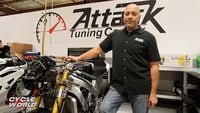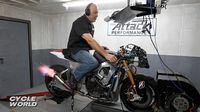Last year, a U.S.-designed-and-built MotoGP Claiming Rule Teams entry attempted to qualify for the U.S.
Grand Prix at Mazda Raceway Laguna Seca and was 21st on the grid and finished 14th a month later at
Indianapolis Motor Speedway. The man who made this happen, Richard Stanboli of Attack Performance,
plans to run a Mk. II version of his production-engine-powered machine at all three U.S. MotoGP races this
year, beginning with the April 19-21 event at the new 3.4-mile Circuit of The Americas near Austin, Texas.
Two-time AMA SuperBike runner-up Blake Young will be in the saddle. Stanboli's previous rider, Steve
Rapp, is now flying commercial aircraft. Like so many present-day riders, the lack of a foreseeable future in AMA Pro Road Racing forced Rapp to get, as Stanboli put it, “a real job.”
I asked Stanboli how his Mk. II will differ from the bike he built in 2012. “We’re changing the rake,” he
said. “That bike behaved differently on the track from what we’d drawn. The way things stacked up, the
numbers didn’t come. We’re working toward less chatter. Also, we’re making software
changes in the MoTeC ECU, separating the traction-control and anti-wheelie functions more. These bikes
require holding the brake on while getting on the gas—no coasting. Steve couldn’t get that in just one race.”
Think of holding the brake on past the throttle-up point as actively maintaining the size of the front tire’s footprint. Let off the brake and the footprint shrinks by half, and front grip goes with it. At Laguna Seca, we all knew Rapp had too much to learn—carbon brakes and unique Bridgestone tires—in too little time, while attempting to dial in a bike finished only hours before.
“I’m not doing AMA SuperBike this year,” said Stanboli, “so I can afford to do this right and still run my
business.” Attack Performance makes sportbike performance parts.
“Also, I’m making the engine odd-fire,” he said. “Odd-fire gets off corners better. The first generation
with the flat crank then maybe a 90-degree crank." A stock Kawasaki ZX-10R crankshaft is "flat," has its crankpins at 180 degrees.
During practice at Indianapolis, a rod bearing failed. “The data showed we were losing oil pressure on
deceleration,” said Stanboli, “more than on the SuperBike because the CRT has carbon brakes and stops
harder.”
Air in the oil is compressed, so when it reaches a bearing, its expansion can “sneeze” essential oil out of it. How is Stanboli going to fix that? “More oil,” he replied. “A deeper sump, so it can’t get air. And the parts are really light—Ti rods, very light pistons.”
I asked Stanboli for insights into how Tom Sykes’ World Superbike Kawasaki improved through last
season. “Power delivery and getting the geometry right,” he said. “They couldn’t get rear tires to last, but he was always fast.”
Can 25-year-old Young come back from his demoralized slump of the past year? Before that, he was the hot
property, the only rider consistently able to challenge three-time AMA SuperBike Champion Josh Hayes. "It
doesn’t make any sense to me that he’s out of a job,” said Stanboli. “Look at the stats. His results speak for themselves.”
So many times, I have seen a rider thaw out “frozen” skills just by switching to a new team and making a
fresh start. The skill and experience are there, they just have to be released.
What rpm and power level are possible with this 76 x 55mm engine? “Two hundred and twenty rear-wheel
horsepower,” replied Stanboli, “somewhere in the 14,500- to 15,000-rpm range. The top of the curve is
pretty flat.”
Attack Performance’s CRT bike impressed a lot of MotoGP insiders by the professionalism of its design and
execution, and the methodical way Stanboli and his crew set about making it work. With adequate time for
preparation, a second try will reveal much more.
Testing, however, is tough because it requires a costly Bridgestone crew. Young rode the updated machine
for the first time on Pirellis at Chuckwalla Valley Raceway, the 17-turn, 2.68-mile road course near Indio, California. Today, the team is testing at CoTA.













/cloudfront-us-east-1.images.arcpublishing.com/octane/QSS5DZ6SKJEU3AKE4KDAWYBEFY.jpg)
/cloudfront-us-east-1.images.arcpublishing.com/octane/SMCEQCLWRVEFTJJES6TAHB3OOQ.jpg)
/cloudfront-us-east-1.images.arcpublishing.com/octane/JCACIDCAC5FUNPTXO2BOUHGGII.jpg)
/cloudfront-us-east-1.images.arcpublishing.com/octane/DC7ZGILA2BCJXHZIUNYGV7JSEA.jpg)
/cloudfront-us-east-1.images.arcpublishing.com/octane/EWJEZUGWEZGABDEQWB64WL46GQ.jpg)
/cloudfront-us-east-1.images.arcpublishing.com/octane/5NHBMRMSFVD5JAPFNMBMNPGXQE.jpg)
/cloudfront-us-east-1.images.arcpublishing.com/octane/WHE43SCPLJBRNANAJAGXHOAIEU.jpg)
/cloudfront-us-east-1.images.arcpublishing.com/octane/6R56AQAW6NDE7BBIJ3SMCOOY5A.jpg)
/cloudfront-us-east-1.images.arcpublishing.com/octane/JMQTUE2FKZFURJTJXDMM4V47AQ.jpg)
/cloudfront-us-east-1.images.arcpublishing.com/octane/P2QYJDMQNVEANMQFXHNB3OVFKQ.jpg)
/cloudfront-us-east-1.images.arcpublishing.com/octane/VNKGXM4AA5BPRGERJOPV6GADAQ.jpg)
/cloudfront-us-east-1.images.arcpublishing.com/octane/2WS4YIFLTNG25L25WP7ZFLSWJM.jpg)
/cloudfront-us-east-1.images.arcpublishing.com/octane/UXRS6ZVQZFC23FY2EDYNT5WMVA.jpg)
/cloudfront-us-east-1.images.arcpublishing.com/octane/7JETMCKNVRGDZIGB3JCITGLPUU.jpg)
/cloudfront-us-east-1.images.arcpublishing.com/octane/OZV6E2KNIJDVHGOKXQQ2AHKLHQ.jpg)
/cloudfront-us-east-1.images.arcpublishing.com/octane/XSKMIBFZIZDN7JC6P7SMNMD3QA.jpg)
/cloudfront-us-east-1.images.arcpublishing.com/octane/ITVHWHVQ75BQBHACERYDJLPLHE.jpg)
/cloudfront-us-east-1.images.arcpublishing.com/octane/M3QRBSQ4VFEVPKYTTM3OETVFBU.jpg)
/cloudfront-us-east-1.images.arcpublishing.com/octane/H3EMT5NJ5BDZPBBH27SW3ADQH4.jpg)
/cloudfront-us-east-1.images.arcpublishing.com/octane/XTROSHDZFJB5DIJYU2VF2REFIU.jpg)
/cloudfront-us-east-1.images.arcpublishing.com/octane/7EUSM4GQEBEFTPAYZ6MOMKMMUQ.jpg)
/cloudfront-us-east-1.images.arcpublishing.com/octane/ZN44KZLHD5CHVIY3WZYAGTPGSI.jpg)
/cloudfront-us-east-1.images.arcpublishing.com/octane/5A776WXBY5GAPDYFTTUEUZNIJA.jpg)
/cloudfront-us-east-1.images.arcpublishing.com/octane/NCYHFQ2S3BAT7EC7VDN2ONGRTU.jpg)